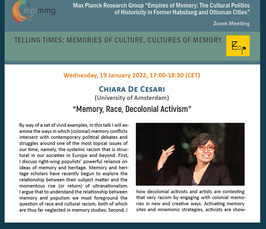“Memory, Race, Decolonial Activism”
- Date: Jan 19, 2022
- Time: 05:00 PM - 06:30 PM (Local Time Germany)
- Speaker: Chiara De Cesari (University of Amsterdam)
- Chiara De Cesari is Associate Professor in European Studies and Cultural Studies at the University of Amsterdam.
- Location: Zoom Meeting

Chiara De Cesari is Associate Professor in European Studies and
Cultural Studies at the University of Amsterdam. Her wide-ranging research explores how forms of memory, heritage, art,
and cultural politics are shifting under conditions of contemporary
globalization and state transformation. Chiara leads a major Dutch Research
Council-funded Vidi project on “Imagining Institutions Otherwise: Art,
Politics, and State Transformation.” She is the author of Heritage and the Cultural Struggle
for Palestine (Stanford UP, 2019), and co-editor of two key volumes in
memory studies (European Memory in Populism, Routledge, 2019; Transnational
Memory, de Gruyter, 2014), and of a special issue of the International
Journal of Heritage Studies on
urban heritage and gentrification (2018). Committed to international and
interdisciplinary collaboration, she has been involved in several major
international research projects. Currently, she is also co-PI of the NWA
project "Pressing Matter: Ownership, Value and the Question of Colonial
Heritage in Museums", and a member of the HERA’s “en/counter/points”
project and the Trans-Atlantic Platform for Social Innovation’s “Worlding
Public Cultures” network.
For more details please contact recke(at)mmg.mpg.de.
By way of a set of vivid examples, in
this talk I will examine the ways in which (colonial) memory conflicts
intersect with contemporary political debates and struggles around one of the
most topical issues of our time, namely, the systemic racism that is structural
in our societies in Europe and beyond. First, I discuss right-wing
populists’ powerful reliance on ideas of memory and heritage. Memory and
heritage scholars have recently begun to explore the relationship between their
subject matter and the momentous rise (or return) of ultranationalism. I argue
that to understand the relationship between memory and populism we must
foreground the question of race and cultural racism, both of which are thus far
neglected in memory studies. Second, I also present preliminary results of
another strand of research I am conducting with Wayne Modest of the National
Museum of World Cultures that focuses on how decolonial activists and artists
are contesting that very racism by engaging with colonial memories in new and
creative ways. Activating memory sites and mnemonic strategies, activists are
showing us how changing the present goes through a reconsideration and
refashioning of the past that may prefigure a more just future.